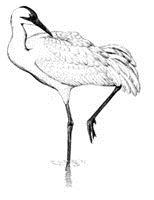North American Crane Working Group

Proceedings of the North American Crane Workshop
Date of this Version
2016
Document Type
Article
Citation
PROCEEDINGS OF THE NORTH AMERICAN CRANE WORKSHOP 13:67-74
Abstract
We studied activity budgets and antipredator behaviors of Mississippi sandhill cranes (Grus canadensis pulla) to determine if parental behavior influenced nest outcomes. We used infrared motion-activated cameras to capture behavioral sequences from 21 nests over a 2-year period. Overall activity budgets were similar among crane pairs regardless of nest outcome. Specific activity patterns did predict nest outcomes; pairs at unsuccessful nests spent more time away from the nest and more time manipulating nest contents than successful pairs, while pairs at nests that were lost to predation cooperated poorly and started the nest a month later on average than successful nests. Wild-reared birds gave more agonistic displays toward potential threats than captive-reared birds, but both wild- and captive-reared birds successfully defended nests from potential predators. The results suggest that behavior patterns of nesting pairs can be used to predict likely nest outcome, and that birds differ in their ability to defend nests from predators. We suggest that training in antipredator behavior during captive rearing may increase behavioral competence and reduce losses to nest predators.
Included in
Behavior and Ethology Commons, Biodiversity Commons, Ornithology Commons, Population Biology Commons, Terrestrial and Aquatic Ecology Commons


Comments
Copyright © 2016 North American Crane Working Group. Used by permission.
Proceedings may include articles not presented at Workshop.